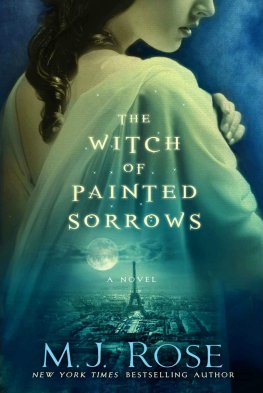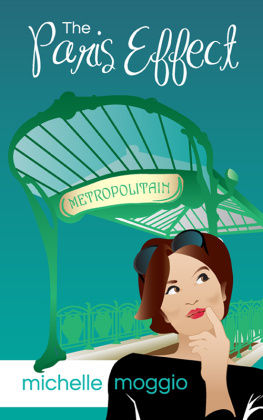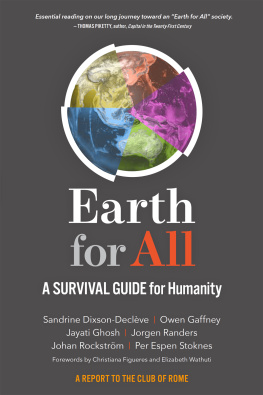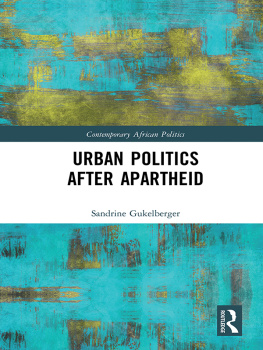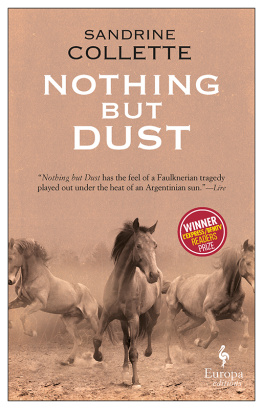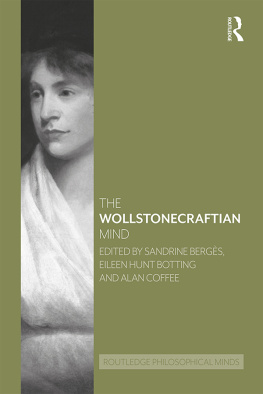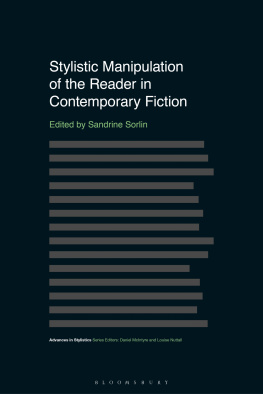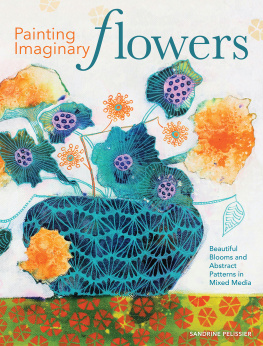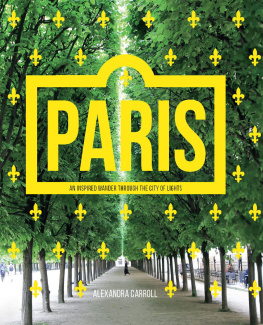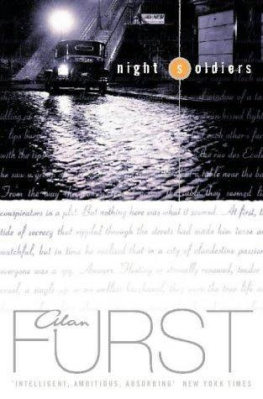The Witch of Painted Sorrows
by M. J. Rose


My fifteenth book to Simon Lipskar, who has been my friend and had my back for fifteen years, for which I will be forever grateful.
What makes night within us may leave stars.
VICTOR HUGO, NINETY-THREE
PARIS, FRANCE
APRIL 1894
I did not cause the madness, the deaths, or the rest of the tragedies any more than I painted the paintings. I had help, her help. Or perhaps I should say she forced her help on me. And so this storywhich began with me fleeing my home in order to escape my husband and might very well end tomorrow, in a duel, in the Bois de Boulogne at dawnis as much hers as mine. Or in fact more hers than mine. For she is the fountainhead. The fascination. She is La Lune. Woman of moon dreams, of legends and of nightmares. Who took me from the light and into the darkness. Who imprisoned me and set me free.
Or is it the other way around?
Your questions, my father always said to me, will be your saving grace. A curious mind is the most important attribute any man or woman can possess. Now if you can just temper your impulsiveness . . .
If I had a curious mind, Id inherited it from him. And hed nurtured it. Philippe Salome was on the board of New York Citys Metropolitan Museum of Art and helped found the American Museum of Natural History, whose cornerstone was laid on my fifth birthday.
I remember sitting atop my fathers shoulders that day, watching the groundbreaking ceremony and thinking the whole celebration was for me. He called it our museum, didnt he? And for much of my life I thought it actually did belong to us, along with our mansion on Fifth Avenue and our summerhouse in Newport. Until it was gone, I understood so little about wealth and the price you pay for it. But isnt that always the way?
Our museums vast halls and endless exhibit rooms fascinated me as much as they did my fatherwhich pleased him, I could tell. Wed meander through exhibits, my small hand in his large one, and hed keep me spellbound with stories about items on display. Id ask for more, always just one more, and hed laugh and tease: My Sandrine, does your capacity for stories know no bounds?
But it pleased him, and hed always tell me another.
I especially loved the stories he told me about the gems and fate and destiny always ending them by saying: You will make your own fate, Sandrine, Im sure of it.
Was my father right? Do we make our own destiny? I think back now to the stepping-stones that Ive walked to reach this moment in time.
Were the incidents of my making? Or were they my fate?
The most difficult steps I took were after certain people died. No deaths were caused by me, but at the same time, none would have occurred were it not for me.
So many deaths. The first was on the morning of my fifteenth birthday, when I saw a boy beaten and tragically die because of our harmless kisses. The next was the night almost ten years later, when I heard the prelude to my fathers death and learned the truth about Benjamin, my husband. And then there were more. Each was an end-ing that, ironically, became a new beginning for me.
The one thing I am now sure of is that if there is such a thing as destiny, it is a result of our passion, be that for money, power, or love. Passion, for better or worse. It can keep a soul alive even if all that survives is a shimmering. Ive even seen it. Ive been bathed in it. Ive been changed by it.

Four months ago I snuck into Paris on a wet, chilly January night like a criminal, hiding my face in my shawl, taking extra care to be sure I wasnt followed.
I stood on the stoop of my grandmothers house and lifted the hand-shaped bronze door knocker and let it drop. The sound of the metal echoed inside. Her home was on a lane blocked off from rue des Saints-Pres by wide wooden double doors. Maison de la Lune, as it was called, was one of a half dozen four-story mid-eighteenth-century stone houses that shared a courtyard that backed up onto rue du Dragon. Hidden clusters like this were a common configuration in Paris. These small enclaves offered privacy and quiet from the busy city. Usually the porte cochre was locked and one had to ring for the concierge, but Id found the heavy doors ajar and hadnt had to wait for service.
I let the door knocker fall again. Light from a street lamp glinted off the golden metal. It was a strange object. Usually on these things the bronze hands palm faced the door. But this one was palm out, almost warning the visitor to reconsider requesting entrance.
I was anxious and impatient. Id been cautious on my journey from New York to Southampton and kept to my cabin. Id left a letter telling Benjamin Id gone to visit friends in Virginia and assumed that once he returned and read it, it would be at least a week before hed realize all was not what it seemed. One thing I had known for certainhe would never look for me in France. It would be inconceivable to Benjamin that any wife of his could cross the ocean alone.
Or so I assured myself until my husbands banking associate, William Lenox, spotted me on board. When he expressed surprise I was traveling by myself, I concocted a story but was worried he didnt believe me. My only consolation was that we had docked in England and I had since crossed the channel into France. So even if Benjamin did come looking, he wouldnt know where Id gone.
That very first night in Paris, as I waited for my grandmothers maid to open the door, I knew I had to stop thinking of what I had run away from. So I re-focused on the house I stood before and as I did, felt an overwhelming sense of belonging, of being welcome. Here I would be safe.
Once again I lifted the door knocker that had so obsessed me ten years before when Id visited as a fifteen-year-old. The engravings on the finely modeled female palm included etched stars, phases of the moon, planets, and other archaic symbols. When Id asked about it once, my grandmother had said it was older than the house, but she didnt know how old exactly or what the ciphers meant.
After standing at the door for a few moments without gaining entry, I lifted the hand and let it drop again. Where was the maid? Grand-mre, one of Pariss celebrated courtesans, hosted lavish salons on Tuesday, Thursday, and many Saturday evenings, and at this time of day was usually upstairs, preparing her toilette: dusting poudre de riz on her face and dcolletage, screwing in her opale de feu earrings, and wrapping her signature rope of the same blazing orange stones around her neck. The strand of opal beads was famous. It had belonged to a Russian empress and was known as Les Incendies. The stones were the same color as my grandmothers hair and the highlights in her topaz eyes. She was known by that nameLIncendie, they called her, The Fire.
We had the same color eyes, but mine almost never flashed like hers. When I was growing up, I kept checking in the mirror, hoping the opal sparks that I only saw occasionally would intensify. I wanted to be just like her, but my father said it was just as well my eyes werent on fire because it wasnt only her coloring that had inspired her name but also her temper, and that wasnt a thing to covet.
It wasnt until I was fifteen years old and witnessed it myself that I understood what hed meant.
I let the hand of fate fall again. Even if Grand-mre was upstairs and couldnt hear the knocking, the maid would be downstairs, organizing the refreshments for the evening. Id seen her so many nights, polishing away last smudges on the silver, holding the Baccarat glasses over a pot of steaming water and then wiping them clean to make sure they gleamed.

